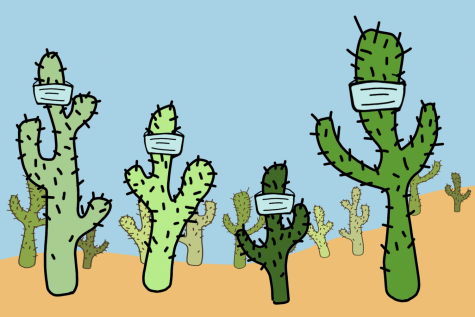OPINION | Community service did not stop with COVID-19

Tulane University is a school that prides itself on its dedication to community service. It is hard to miss the “#1 in students engaged in community service” banners plastered around campus. In the age of COVID-19, however, the opportunity for in-person service is limited to prevent harming the communities that service is supposed to benefit.
Tulane’s countless service clubs have adapted to these new circumstances in search of the balance between providing service and keeping distance. This adjustment has come in many forms — from switching to primarily virtual programming to shifting the target of the service. The changes have not been all for the worse; many club leaders have credited COVID-19 with forcing them to be more flexible and to make adjustments that they plan to continue past the pandemic.
Organizations such as the Foundation for International Medical Relief of Children and Tulane Alternative Breaks have entirely restructured in the face of the pandemic. FIRMC typically makes volunteer trips to nursing homes and hospitals. However, doing so now would put the residents of these facilities at too great of a risk. Instead, they opted to create a pen pal service with residents of St. Margaret’s at Mercy, a nursing home, and have been dropping off personalized canvases.
Due to travel restrictions, Tulane Alternative Breaks is unable to complete their typical service trips during school holidays. Instead, they organized a day of service at the New Orleans Earnest N. Morial Convention Center when it served as a shelter for Hurricane Laura evacuees.
Catherine Grayson, the president of Alternative Breaks, said they were determined to have a “positive impact on our southwest Louisiana neighbors whose help ran deeply in New Orleans after Katrina.” To orchestrate this day of service, the club worked with students living in Green Wave Hall who are in walking distance from the Convention Center. Not only did Tulane Alternative Breaks help those who were displaced by Hurricane Laura, but they provided an opportunity for students who are not living in a typical campus setting to meet one another.
While community service on paper is purely altruistic, it typically benefits those performing it as well. This has motivated members of the Community Action Council of Tulane University Students organizations to become creative with how they help.
Sarah Donato, the vice president of Tulane’s Special Olympics, cited her involvement with the club as a “bright spot of joy” during COVID-19. Special Olympics transitioned to virtual practices and currently hosts practices for five different sports over Zoom four nights a week. Parents of their athletes have contacted the executive board of Special Olympics to tell them that it has been very helpful to make their athletes feel less isolated during this time, especially because many are homeschooled. Unfortunately, there is only so much that a virtual experience can do. Some athletes are unable to attend virtual events.
After School Allies made similar adjustments in order to still provide tutoring services to students in New Orleans. They transitioned from in-person meetings to Google Meet meetings. Kellie Arevalo, the president of After School Allies, is optimistic that they can continue to use this tool even after the pandemic.
The leaders of Tulane’s service clubs have been independently motivated to continue performing the service that they are passionate about. They could have taken this as an opportunity to slack off. Instead, they chose to make the best of these unprecedented circumstances and to continue to benefit others.
These Tulane students have done an impressive job in helping the greater New Orleans community, even in comparison to Tulane’s own administration. Regardless, during the COVID-19 pandemic, it is imperative for Tulane students to help the residents of New Orleans who have been so greatly affected by our presence in the city.
Your donation will support the student journalists of Tulane University. Your contribution will allow us to purchase equipment and cover our annual website hosting costs.


